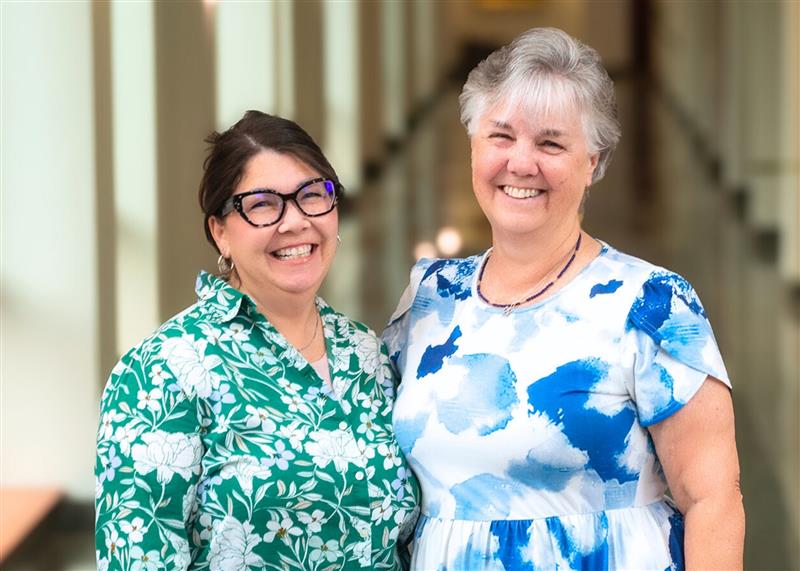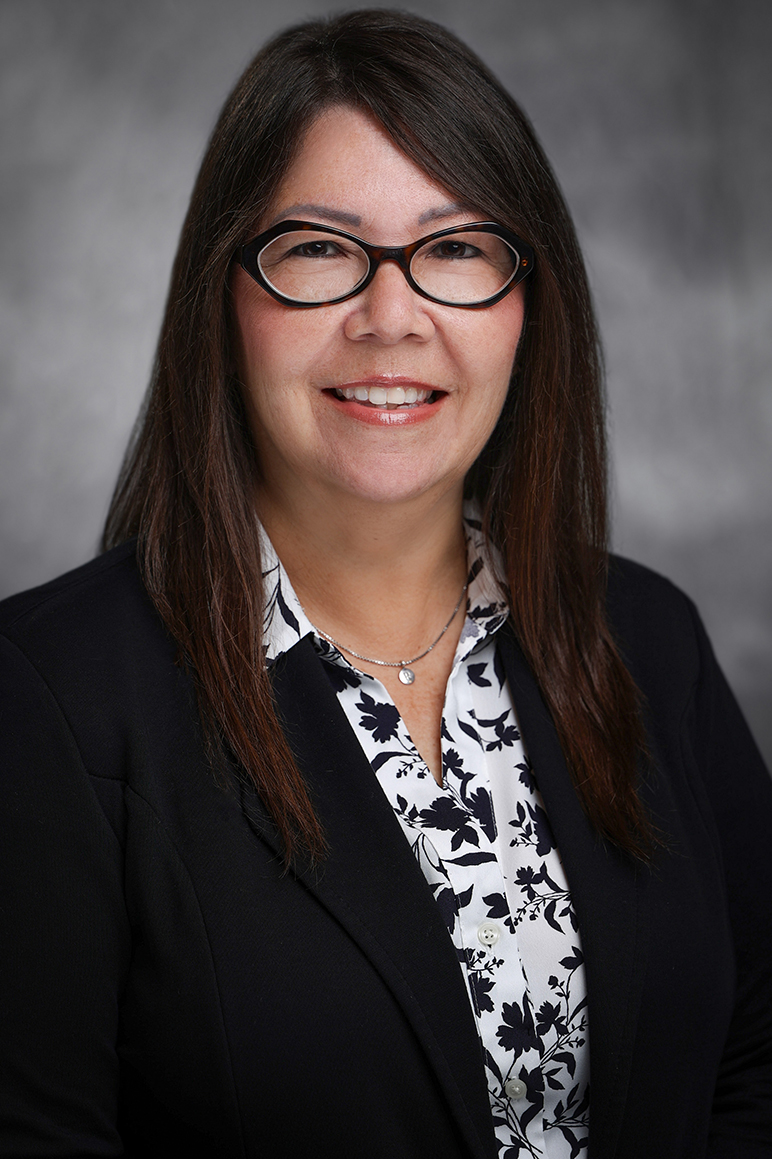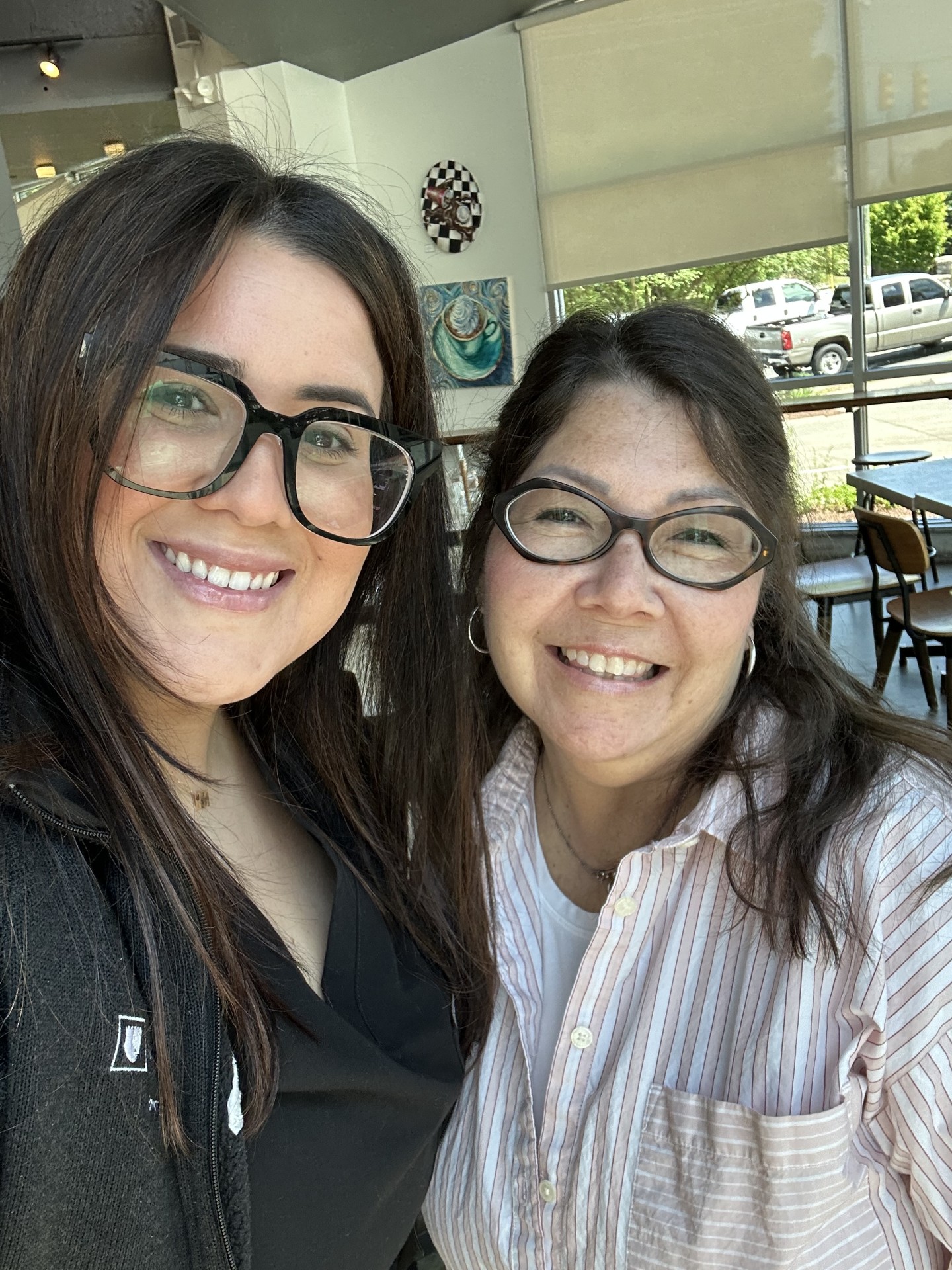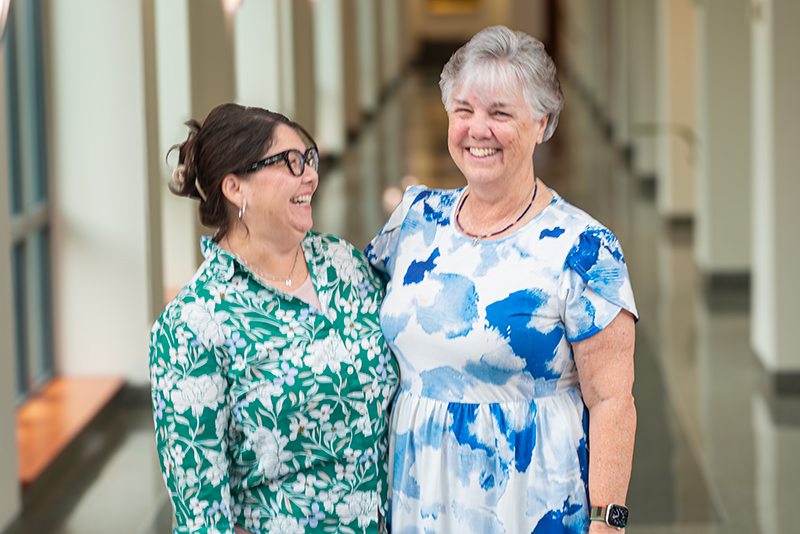Nursing Saves Lives: A Heart Attack Connects Duke Staff, Student, and Faculty
When a staff member at the School of Nursing suffered a sudden heart attack, compassionate care from a Duke nursing student and continued support from faculty brought home the impact of nursing education and the meaning of community.

In December 2023, Duke University School of Nursing staff member Vicki Rennecker-Nakayoshi suffered a sudden heart attack and was rushed to the emergency room of Duke University Hospital.
“In an instant, my world changed,” Rennecker-Nakayoshi remembered. “I was terrified and vulnerable.”
The care Rennecker-Nakayoshi received from a nurse who turned out to be a student at the School, along with support from a cardiology faculty member on her path towards healing, gave Rennecker-Nakayoshi a profound understanding of the importance of nursing education and the true meaning of community.
Staff and Student Become Patient and Nurse
In addition to serving as the Director of Annual Giving and the Bessie Baker Society at the School of Nursing, Rennecker-Nakayoshi is also co-advisor to the School’s Student Council and enjoys frequent face time with students. When she entered the emergency room after her heart attack, the calm and compassionate presence of a Duke graduate nursing student grounded her in a moment of chaos.
“In that instant, the roles were reversed. I was no longer a staff member working behind the scenes. I was a patient, experiencing firsthand the life-saving impact of our mission,” said Rennecker-Nakayoshi.
The nursing student who cared for Rennecker-Nakayoshi was Margaret Duvalle, who came to Duke Hospital after receiving her BSN, eventually moving to the ER and becoming a charge nurse.
Though not her assigned nurse, Duvalle entered Rennecker-Nakayoshi's room to insert an ultrasound guided IV so that medication could be administered quickly and efficiently. After speaking with Rennecker-Nakayoshi and learning about her job, Duvalle shared that she would soon be starting a graduate program at the School, and this connection instantly had a calming and reassuring effect. “I was being cared for by someone stepping into the future of nursing—a future we help shape every day,” said Rennecker-Nakayoshi.
Duvalle stayed with Rennecker-Nakayoshi for the duration of her ER visit. “I’m so glad my short time with Vicki was able to make such a difference,” said Duvalle. “As an ER nurse, you have to remember that there's a human being in front of you, a person who is scared, a person who is having the worst day of their life. It might be something you see every day, but for them it’s often completely new, and they’re looking to you for answers and support.”
A Faculty Colleague’s Support for Rennecker-Nakayoshi’s Healing Journey
After her initial ER visit, Rennecker-Nakayoshi still had a long road towards healing.
“I experienced a range of emotions I hadn’t fully anticipated—grief, confusion, and even moments of guilt or self-doubt,” said Rennecker-Nakayoshi. “Physically, there were periods where I felt drained, like my body was holding onto the weight of the experience. Emotionally, I often needed space to untangle what had happened and what it meant for me moving forward.”
While Rennecker-Nakayoshi leaned on friends, therapy, and inner strength to process the ordeal, she was also helped along the way by Margaret “Midge” Bowers, DNP, FNP-BC, CHSE, FAANP, FAAN, FAAC, Professor and Director of the cardiology nursing specialty at the School, who became a valuable resource on cardiac health and healing.
“I was a calm, friendly face, because we knew each other from our work,” said Dr. Bowers. “I put realistic expectations in place, listened to Vicki's concerns, and encouraged her on her journey.”
Dr. Bowers also made space for the gendered components that might otherwise receive less attention. “Women in our society, and in many societies, tend to be the caregivers. But it’s crucial that women also take care of themselves, especially when it comes to heart health,” said Dr. Bowers.
According to the CDC, heart disease is the leading cause of death for men and women in the United States. However, popular conceptions of heart disease are based primarily around men's experiences.
“Women present differently. Most women don’t experience chest pain like what you see on TV. They present with profound fatigue, nausea, and maybe no pain,” said Dr. Bowers. “Women at every life stage need to know their family history and be attuned to possible symptoms.”
Dr. Bowers’ emphasis on women’s heart health deeply resonated with Rennecker-Nakayoshi. “We must remind ourselves and each other that our well-being is just as important as the well-being of those we care for,” said Rennecker-Nakayoshi. “Taking care of ourselves isn’t selfish—it’s essential.”
From Patient to Survivor, from Survivor to Advocate
Now more than a year out from her heart attack, Rennecker-Nakayoshi is not only a survivor, but has become a community advocate, fundraising for the American Heart Association’s Triangle Heart Walk.
“This is just the beginning, but I’m committed to using my experiences to help others better understand the importance of heart health,” said Rennecker-Nakayoshi.
Meanwhile, Duvalle and Dr. Bowers have also taken something away from the experience.
“The School of Nursing community is not just the building or the structure, it’s all the people you connect to and how you connect,” said Dr. Bowers.
Duvalle, who is currently one of Dr. Bowers’ MSN students, balances her classwork, clinical rotations, and working full time in the ER, attributing her career growth to opportunities she’s had at Duke. “I’ve grown from a baby nurse to a leader and a resource in the department, and I don't think that I would have received this kind of training anywhere else.”
For Rennecker-Nakayoshi, her encounter with Duvalle still serves as a reminder of what nursing truly means.
“Nurses are not only clinicians—they are anchors of humanity during our most vulnerable times. They bring comfort, dignity, and hope. I am incredibly proud of our students and who they become. And I am forever grateful that our paths can cross in such life-affirming ways,” said Rennecker-Nakayoshi.
“This experience underscored for me that the work we do in nursing education has a ripple effect far beyond the classroom. It’s not just about degrees—it’s about lives changed, both for those who serve and those they serve. It saved my life.”


